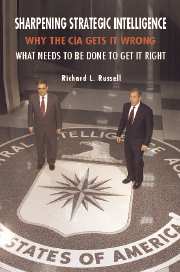 Sharpening Strategic Intelligence
Sharpening Strategic Intelligence Book contents
- Frontmatter
- Contents
- Acknowledgments
- Sharpening Strategic Intelligence
- 1 Strategic Intelligence and American Statecraft
- 2 Debunking Cold War Myths
- 3 Stumbling after the Cold War
- 4 Blundering in the “War on Terrorism”
- 5 Spies Who Do Not Deliver
- 6 Analysts Who Are Not Experts
- 7 Facing Future Strategic Intelligence Challenges
- Notes
- Selected bibliography
- Index
2 - Debunking Cold War Myths
Published online by Cambridge University Press: 26 July 2009
- Frontmatter
- Contents
- Acknowledgments
- Sharpening Strategic Intelligence
- 1 Strategic Intelligence and American Statecraft
- 2 Debunking Cold War Myths
- 3 Stumbling after the Cold War
- 4 Blundering in the “War on Terrorism”
- 5 Spies Who Do Not Deliver
- 6 Analysts Who Are Not Experts
- 7 Facing Future Strategic Intelligence Challenges
- Notes
- Selected bibliography
- Index
Summary
Arefrain frequently heard from senior cia officials in defense, if not denial, of the intelligence debacles of 9/11 and the Iraq War is that the public must remember the CIA “won the Cold War” against the Soviet Union. Never mind the fact that the Cold War ended about half a generation ago, these CIA apologists would have the public, the Congress, and the White House tread lightly in current criticisms out of deference to the CIA's purported decisive role in “winning the Cold War.” The implicit defense is that the CIA in a “golden era” during the Cold War was a well-honed instrument to support the commander in chief against a formidable nation-state adversary. The argument, though, reflects more than a fair share of hubris on the part of those CIA officials who spent the lion's share of their careers in the Cold War. It fails to recognize that intelligence is merely one of many tools, including diplomatic, military, and economic strength, that the presidents wielded to contain the Soviet Union until the weight of its own internal inconsistencies brought the Soviet empire crashing down.
A comprehensive diagnosis of what hampers the CIA's ability to craft and deliver strategic intelligence for the commander in chief requires an analysis of its performance during the Cold War. Recent investigations of intelligence failures by congressional committees and presidentially appointed commissions have had only a narrow investigative scope of events surrounding 9/11 and the Iraq War.
- Type
- Chapter
- Information
- Sharpening Strategic IntelligenceWhy the CIA Gets It Wrong and What Needs to Be Done to Get It Right, pp. 29 - 52Publisher: Cambridge University PressPrint publication year: 2007


